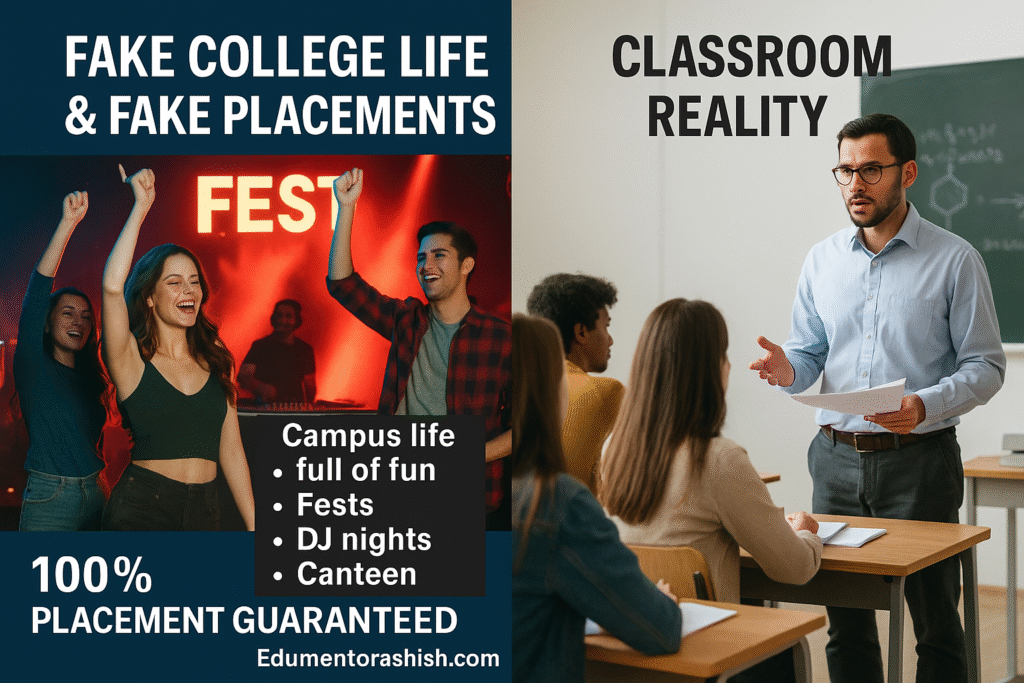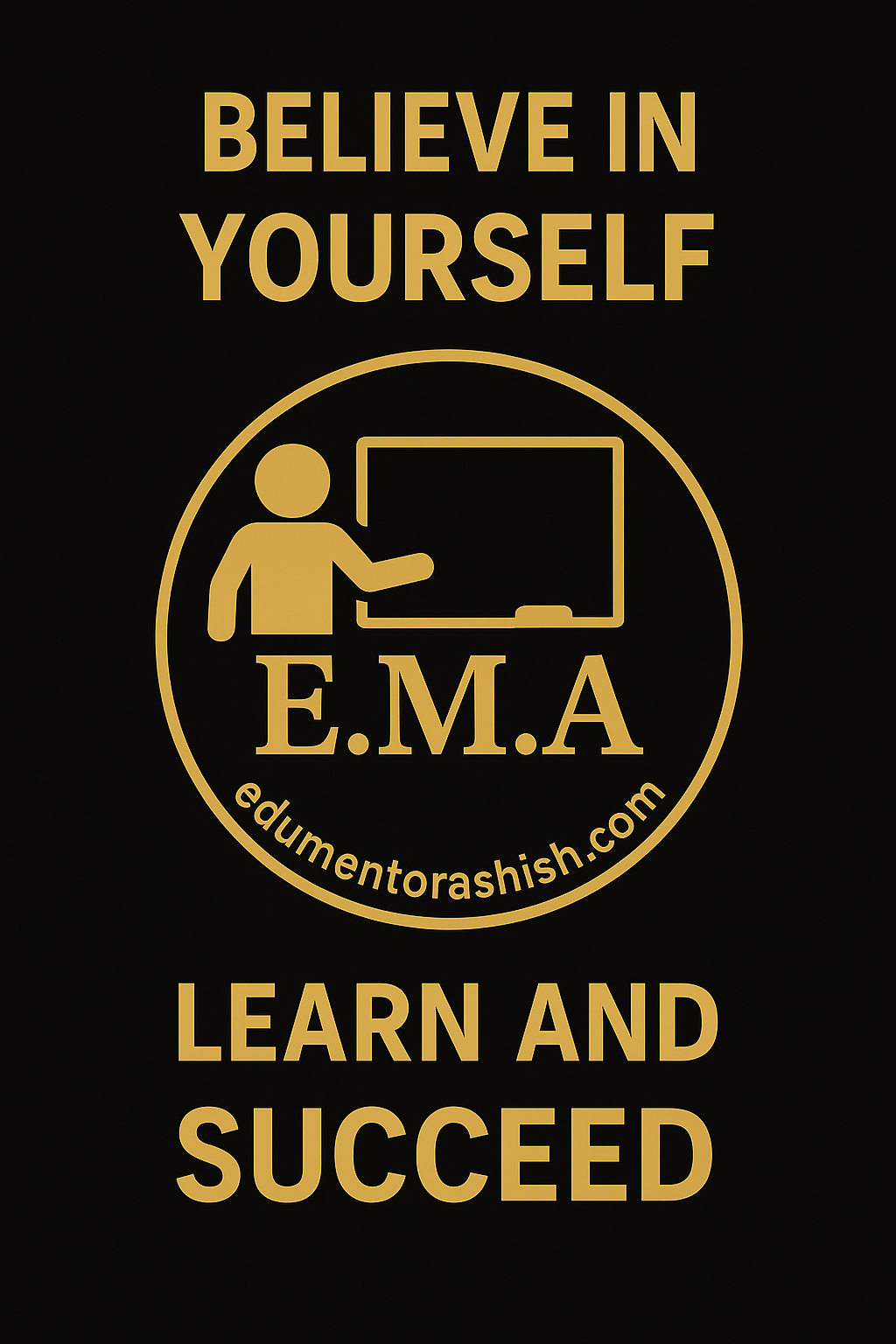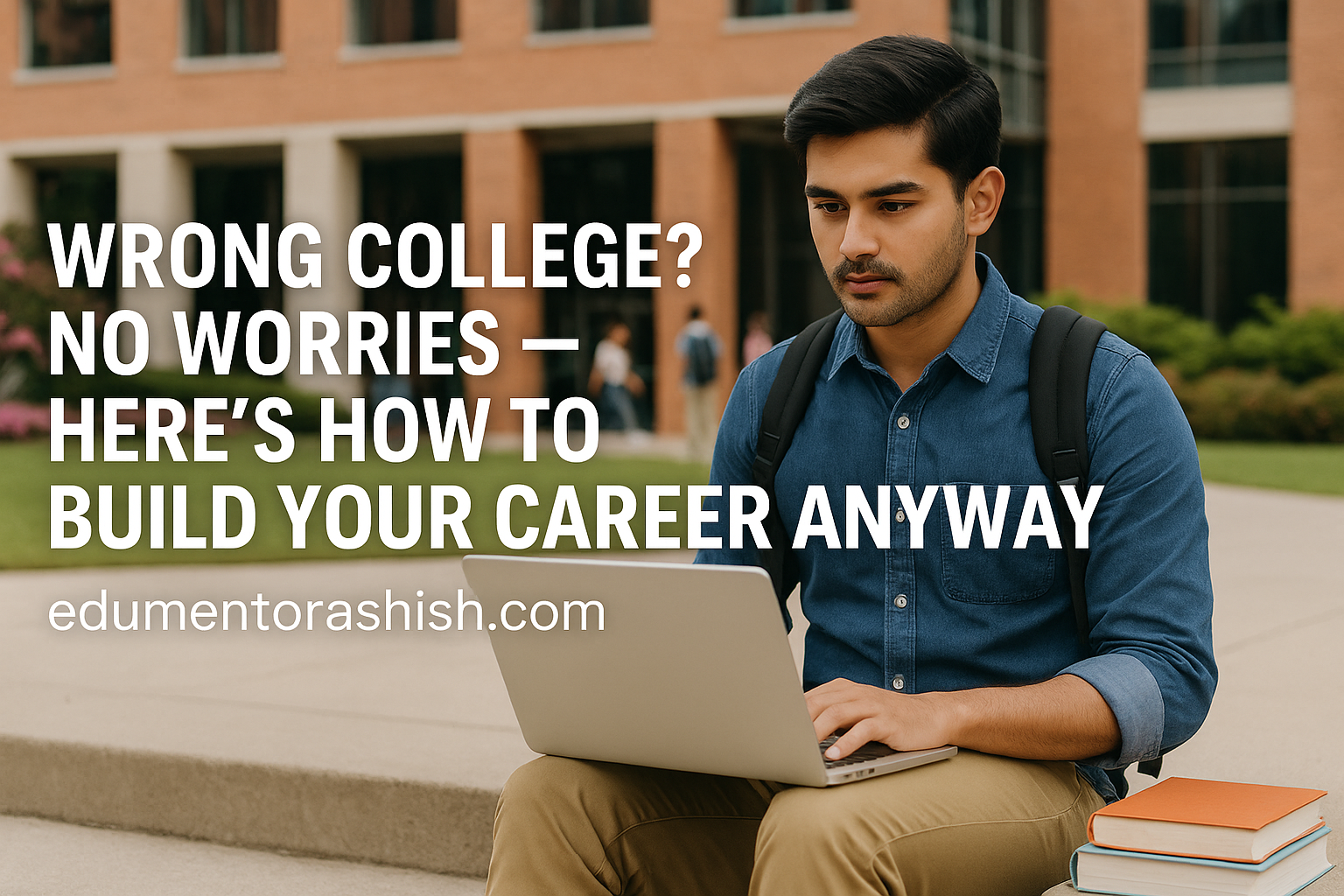A) Introduction — (Why this matters)
When every student enrolls in a professional course like pharmacy, they have a dreamy picture in their mind—endless fun in the canteen with friends, fests, parties, Instagram-worthy campus life, and absolutely dazzling placements with companies lined up. These fantasies are natural, as colleges highlight this glamorous side in their advertisements.
But when actual classes begin, the reality is a bit different. 9 AM lectures, repeated experiments in practical labs, assignments, and a race for exams, no extracurricular or co-curricular activities, no guidance regarding the future… And that’s when the student wonders: “Did I choose the right college?”

And many times, the dreams you were shown when you were admitted to college turn out to be completely false. There are no classes, no teachers, no lab work, and the placements promised in the advertisement are all fake. During this time, you feel quite cheated.
At this point, it’s important to understand a simple truth:
Choosing the right college isn’t just about a name, but about a combination of opportunities, quality teaching, real infrastructure, and mentorship.
A good college is one that can be a launchpad for you:
• Provides you with a strong academic foundation.
• Provide industry or research exposure.
• Teachers who not only complete the syllabus but also guide you.
• Provide extracurricular and co-curricular platforms for your personal growth.
So, whenever you think about admission or evaluate your current college, you should always remember one thing—the real purpose of college life is not to get a degree, but to shape your career and personality.
B) Student Expectations vs. Reality
When a student enrols in pharmacy or any other professional course, they have a picture of an ideal college life in their mind.

Common Student Expectations:
• 🎉 Campus life full of fun: fests, DJ nights, friends in the canteen, and a cinematic college journey.
• 🏢 State-of-the-art infrastructure: Modern labs, AC classrooms, large auditoriums, and shiny buildings.
• 👨🏫 World-class faculty: Teachers who make every lecture interesting and engaging.
• 💼 Instant placements: By the time your final year arrives, you should have a long list of MNCs in front of you, and you should get a job with a high package.
• 🌍 Unlimited exposure: Industrial visits, foreign collaborations, conferences, and internships.
But… the reality is a little different 👇
Actual Reality:
• 📚 Regular attendance and discipline are expected in classes and labs. There is definitely fun, but with that comes a heavy workload.
• 🧪 Labs and infrastructure look good on paper, but in reality, machines may be outdated or rarely used.
• 👨🏫 Faculty has talented teachers, and some who merely cover the syllabus as a formality.
• 💼 Placements are not guaranteed like advertisements. Companies only hire selected students, and the package varies.
• 🌍 Exposure is available, but students have to take initiative. Simply waiting for the college to arrange everything is the wrong approach.
Fantasies about college life aren’t wrong—it’s important that students enjoy it. But the real focus should be on finding yourself, seeking guidance from mentors, seizing opportunities, and shaping your career.
C) 10 Essential Qualities of a Good College (What to Expect in a Good College)
When choosing a college for admission, just looking at the “name” or “glamorous advertisements” isn’t enough. You need to consider how the college will truly shape your future. A good college is one that offers real growth opportunities, both academically and financially. Here are 10 qualities you should check: Let’s take an example of a pharmacy college in India.
1. Accreditation & Affiliation
• The college must have proper approval from the PCI (Pharmacy Council of India).
• Simple way to verify: Go to the PCI website and check the list of affiliated colleges.
2. Qualified & Experienced Faculty
• Don’t rely solely on the “faculty list.” It’s important to look at the teachers’ qualifications (PhD, M.Pharm), their research papers, and industry exposure.
• You can also check their profile on LinkedIn.
3. Infrastructure & Labs
• A functional pharmacy college should have labs such as: Pharmacology lab, Pharmaceutics lab, Analytical lab (HPLC, UV instruments).
• Don’t just look at photos or brochures—it’s best to visit the labs in person.
4. Clinical/Industrial Tie-ups
• The college should have industry collaborations, hospital tie-ups, and a reasonable number of internships.
• Ask how many students have interned in the last two years and where.
5. Placement Transparency
• If a college claims “100% placements,” be sceptical.
• Genuine colleges provide you with past placement lists—with student name, company, and salary breakdown.
6. Research & Project Opportunities
• A good college encourages students to pursue projects, minor research, publications, and attend conferences.

• Check how many student publications or poster presentations have been made in the last three years.
7. Student-Teacher Ratio & Mentorship
• Quality education occurs when a teacher has a manageable number of students.
• A good mentor guides you not only in academics but also in career and personality development.
8. Extra-Curricular Ecosystem
• College life is not just about studies.
• Your college should have sports clubs, cultural activities, NSS, NCC, debate clubs, and entrepreneurship cells. These activities develop your leadership and communication skills.
9. Soft-Skill & Career Support
• Resume writing workshops, interview preparation sessions, communication classes—these should all be part of a good college.
• Just having knowledge isn’t enough; you must also be able to present it.
10. Active Alumni Network
• A good college is always connected with its alumni.
• Alumni are extremely helpful in finding internships, jobs, and career guidance.
• Check: Are the college’s alumni active on LinkedIn?
💡 Pro Tip: Use all these points as a checklist before admission. Ask each college these questions directly. If they are transparent, you will confidently get every answer.

D) Co-curricular and Extra-curricular Activities — What Can Students Expect?
In a professional course like pharmacy, classroom and lab knowledge alone is not enough. Co-curricular and extra-curricular activities are equally important for your overall growth. These activities not only make you a better professional but also a confident human being.
🎓 Co-curricular Activities (Related to Academics)
These are activities that directly support your academic learning:
• Workshops & Seminars: e.g., HPLC training, IPR workshop, pharmacovigilance seminar.
• Journal Clubs: Discuss research papers and understand the latest trends.
• Industrial / Hospital Visits: Visit manufacturing units or hospital pharmacy departments.
• Research Projects & Dissertations: Projects for UG/PG students that give them a taste of real research.
• Skill Development Courses: Short-term courses such as clinical research, quality control, regulatory affairs.
👉 Benefit: These activities help you develop subject depth, a research mindset, and practical skills.

🌟 Extra-Curricular Activities (Beyond Academics)
These activities polish your personality and soft skills:
• Cultural Festivals & Annual Functions: Dance, music, drama, art — boost both creativity and confidence.
• Sports & Fitness: Team games (cricket, football, badminton) develop leadership and teamwork skills.
• Clubs & Societies: Debate club, photography club, entrepreneurship cell, social service group (NSS/NCC).

• Community Pharmacy Activities: Health awareness camps, blood donation drives, rural health programs.
👉 Benefit: These activities give you communication, leadership, teamwork, and stress-management skills, which are equally important for a career.
🔑 Why These Matter?
• To become a pharmacy professional, simply “knowing how to make tablets” is not enough.
• You need to be a good communicator, problem-solver, and socially responsible professional.
• And these things are learnt not in classrooms but through co-curricular and extra-curricular platforms.
E) Fake College Life & Fake Placements — How to Identify (Red Flags 🚩)
Many colleges today run glamorous advertisements to attract students. Brochures feature shiny labs, Instagram reels feature grand festivals, and billboards feature “100% Placement Guaranteed” slogans. But the reality is different.
You must carefully evaluate these things before admission. Here are some major red flags that should alert you:
🚩 1. 100% Placement Claims
• No genuine college ever claims “100% placement guaranteed.”
• Real placement reports contain student names, company names, and package details.
• If the college simply shows a percentage without proof, you should be skeptical.
🚩 2. Fake Testimonials
• If the student’s name and photo in the testimonials are vague (e.g., “Ravi K. – MNC placed”), understand that it may be copy-pasted content.
• Genuine testimonials contain the student’s full name, batch year, and the exact name of the company.
🚩 3. Stock Photos & Edited Videos
• If the photos on the brochure or website look too perfect, chances are they are stock images.
• You can check by doing a reverse image search.
🚩 4. Over-Promising Salary Packages
• Advertisements read: “Our students placed with 12 LPA packages”.
• Reality: Only 1–2 exceptional students get high packages, rest average students get 2–4 LPA jobs.
• Always ask for CTC breakup (fixed vs variable salary, internship vs full-time).
🚩 5. “Guaranteed Foreign Internship/Job”
• Many colleges promise foreign internship to attract. But they are mostly paid tours, where actual academic or industry exposure is less.
🚩 6. Campus Life Glorification
• By highlighting canteen, fest, fashion show, DJ nights it seems that academics are optional.
• A genuine college will always highlight a balance of academics and extracurricular activities, not just the glamour part.
🚩 7. Avoid Alumni/Student Access
• If you try to talk to seniors or alumni and the college refuses, that’s a big red flag.
• A genuine college always showcases its culture through current students and alumni.
✅ How to Verify Before Admission?
1. Ask for placement lists (names + companies + packages).
2. Search for alumni on LinkedIn and get their feedback by messaging them directly.
3. Visit campus and observe the labs in person.
4. Watch real videos of college events on YouTube/Instagram pages.
5. Ask clearly about the fee refund policy.
💡 Simple Rule:
“The bigger the guarantee, the bigger the doubt.” Judge a college based on its transparency and student reviews, not glossy advertisements.
F) If a student has mistakenly taken admission, what should they do now? (Action Plan ✅)
Many times, a student takes admission and realizes midway through college—“Man, I made the wrong choice!”
But there’s no need to stress. College life is a learning platform, and even if the institute isn’t perfect, you can still build your career. Here are some smart steps:
1. Stay Calm & Accept Reality
• Stop regretting things first.
• Not every college is perfect, but every student can shape their own future.
• Change your mindset: From “How much is college offering me?” to “How much can I take from college?”
2. Assess Available Resources
• See how supportive the college labs, library, and teachers are.
• Even if your instruments are outdated, learn the basics and upgrade with external certifications.
3. Build Your Own Curriculum
• Use online platforms: Coursera, NPTEL, Udemy, LinkedIn Learning.
• Courses such as: Analytical Techniques (HPLC, GC, UV), Regulatory Affairs, Pharmacovigilance, Clinical Research.
• Complete a certificate every semester to strengthen your CV.
4. Internships & Practical Exposure
• Don’t rely solely on college placements.
• Apply for internships yourself at hospitals, community pharmacies, and local industries.
• Short-term internships can be arranged through LinkedIn and alumni networks.
5. Networking = Your Biggest Asset
• Contact alumni and seek guidance from seniors.
• Create a professional profile on LinkedIn and share your projects.
• Attend pharma conferences, webinars, and workshops.
6. Develop Extra Skills
• Improve communication, presentation, and report writing.
• Learn Excel and basic statistics (helpful for research and QA/QC).
• Join public speaking or debating clubs (builds confidence).
7. Competitive Exam Option
• If college placements are poor, start preparing for GPAT, NIPER, Drug Inspector, and Pharmacist exams.
• These exams will open better career doors for you.
8. Focus on Mini Goals
• 30 days → Complete an online course.
• 60 days → Get an internship certificate.
• 90 days → Update your LinkedIn profile and make at least 10 professional connections.
9. Stay Positive & Take Charge
• A wrong college doesn’t mean the end of your future.
• A proactive student can build a top career even from a mediocre college.
G) Checklist: 15 Questions to Ask Before Choosing a College ✅
Relying solely on brochures, advertisements, or counsellor’s advice during admissions can be risky. A smart student is one who clarifies their doubts and asks for proof of everything. This checklist of 15 questions will help you choose a genuine and career-oriented college:
📌 Academic & Recognition
1. Is the college PCI approved? (Check the name and affiliation by visiting the website)
2. Which university is affiliated with? (Verify on the university’s official website)
3. What is the faculty list, along with their qualifications and experience?
📌 Infrastructure & Labs
4. How many labs are functional and what instruments are available? (HPLC, UV, GC, etc.)
5. Does the library have updated pharmacy journals and e-resources?
6. How many clinical/industrial tie-ups are there?
📌 Placements & Career Support
7. What is the placement record for the last three years? (Student names + companies + package breakdown)
8. Do companies visit campus regularly or only once or twice?
9. Are there soft-skill training, interview preparation, and resume workshops?
📌 Student Growth Opportunities
10. Are research projects and paper presentation opportunities provided?
11. Are students supported to attend national/international conferences?
12. What are the active clubs and societies in the college? (NSS, NCC, debate, entrepreneurship, etc.)
📌 Alumni & Network
13. Is the alumni network active? (Do alumni interact with students?)
14. Can you speak directly with current students or alumni for feedback?
📌 Financial & Policy
15. What is the fee refund policy if admission is cancelled? (Ask for written proof)
💡 Tip: Make this checklist a printable PDF and bring it to admissions. Write down and verify each answer. The more transparent a college is, the more confidently it will answer these questions.
G) Conclusion + Call to Action
College life is a golden phase—it’s not just a place where you earn a degree, but also a place where you develop your identity and career direction. But the problem arises when students enroll based solely on advertisements, glamour, and fantasies, only to realize mid-college that “I should have come to the wrong place.”
Remember:
• Choosing the right college = securing your future.
• The true value of a college lies not in its name, but in the transparency of teaching, mentorship, labs, internships, and placements.
• And even if you accidentally get admitted to the wrong place, the game isn’t over. You can build your career through internships, certifications, networking, and self-preparation.
The true purpose of pharmacy and any professional course is the same:
👉 “To develop students into responsible, skilled, and confident professionals and better human beings.”
Therefore, students should keep their eyes and minds open during admissions, verify everything, and make smart career decisions.
College provides a platform, but achieving success depends on your efforts. If you are proactive, even a mediocre college can lead to an extraordinary career.
📌 Call to Action:
If you are a student and are confused about admission, or want to evaluate your current college, follow the checklist in this blog.
And if you need more career guidance, motivation, and practical tips, visit:
Here you’ll find blogs, strategies, and real-life experiences that will clear your doubts and give you a better direction.
You can also visit my YouTube channels for more information:

For personal guidance, you can write to me at edumentorashish@gmail.com





Hi Neat post Theres an issue together with your web site in internet explorer may test this IE still is the marketplace chief and a good component of people will pass over your fantastic writing due to this problem
I loved as much as you will receive carried out right here The sketch is attractive your authored material stylish nonetheless you command get got an impatience over that you wish be delivering the following unwell unquestionably come more formerly again since exactly the same nearly a lot often inside case you shield this hike
Your blog is a breath of fresh air in the often stagnant world of online content. Your thoughtful analysis and insightful commentary never fail to leave a lasting impression. Thank you for sharing your wisdom with us.
Thank you very much for your kind words
I simply could not go away your web site prior to suggesting that I really enjoyed the standard info a person supply on your guests Is going to be back incessantly to investigate crosscheck new posts
Thanks for the auspicious writeup. It if truth be told was a amusement account it. Look complicated to more introduced agreeable from you! By the way, how could we communicate?
Thanks and write me at edumentorashish@gmail.com
This is a great article, i am simply a fun, keep up the good work, just finish reading from https://websiteerstellenlassenbamberg.de// and their work is fantastic. i will be checking your content again if you make next update or post. Thank you
Thanks for sharing. I read many of your blog posts, cool, your blog is very good.
Thanks for sharing. I read many of your blog posts, cool, your blog is very good.